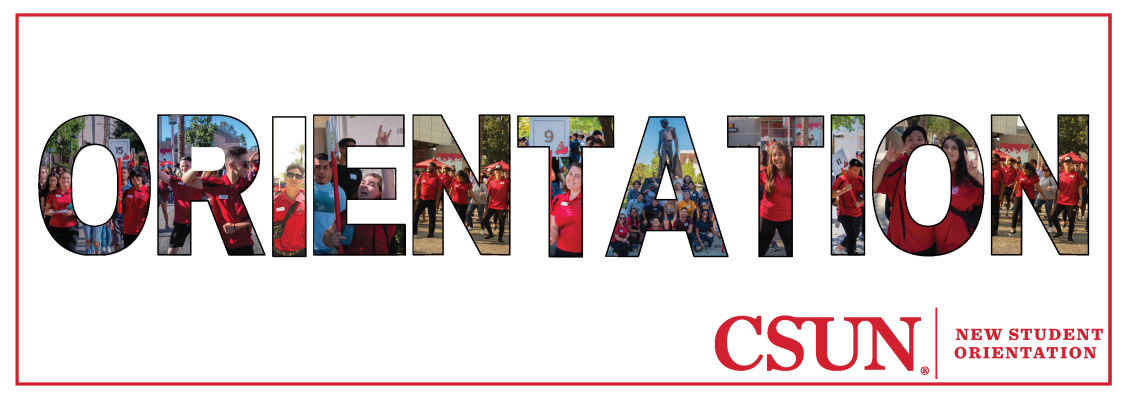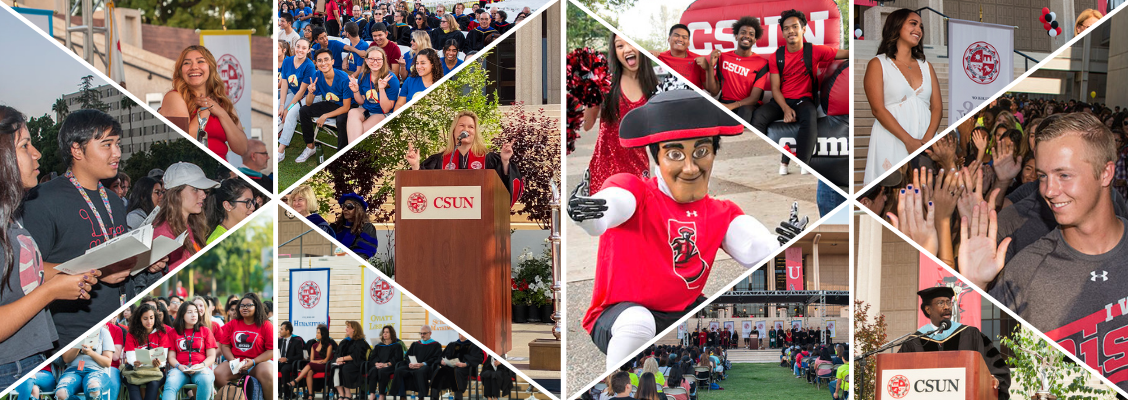First-Time Freshmen Orientation
Register for New Student Orientation
Hello New Matadors!
The New Student Orientation (NSO) experience is a required for all entering Freshman students and will occur over the summer leading up till the Fall semester.
In keeping with the goal of New Student Orientation, we have designed this program to meet the needs of incoming first-time freshmen by:
- Showcasing a welcoming environment that builds a sense of community
- Providing an opportunity to gain knowledge and information on campus resources and services
- Offering a framework that will allow students to make informed and appropriate academic plans and social choices
- Encouraging connections among current and new students, faculty, and staff
- Building awareness of campus locations/geography
- Enhancing understanding of strategies for success
Registration for New Student Orientation
Emails with registration instructions are sent to new students about a month prior to programs taking place. You can also visit this web-page for registration information as it becomes available.
Click the drop down options below to learn more about DATES, NSO SCHEDULES and other important information.
NSO Spring 2025 Dates
Spring NSO for First time Freshmen will be on:
Tuesday, January 14, 2025, 9:00AM - 2:00PM
NSO Agenda
| Time: | Component: |
| 9:00 am | Check-In for Students (Breakfast & Refreshments Served) |
| 9:30 am | Campus Tours |
| 10:40 am | University Welcome |
| 10:50 am | Student Involvement & Information Technology |
| 11:10 am | Steps to Academic Success |
| 11:45 am | Classrooms & Community |
| 12:30 pm | Lunch |
| 1:30 pm | Resources & Services Fair |
| 2:00 pm | NSO Program Concludes |
The following agenda is an example of a typical Fall NSO program; students are required to attend the entire event.
| Time: | Component: |
| 8:00 am | Check-In for Students (Breakfast & Refreshments Served) |
| 9:00 am | Campus Tours |
| 10:15 am | University Welcome |
| 10:50 am | Student Involvement & Information Technology |
| 11:10 am | Steps to Academic Success |
| 12:00 pm | Lunch / Resources & Services Fair |
| 2:00 pm | Classrooms & Communities |
| 3:15 pm | TAKE Performance & Facilitation |
| 6:00 pm | NSO Concludes |
NSO Components and Learning Outcomes
First Time Freshman
Components and Student Learning Outcomes
In keeping with the goal of New Student Orientation, we have designed this program to meet the needs of incoming first-time freshmen by:
- Showcase a welcoming environment that builds a sense of community
- Providing an opportunity to gain knowledge and information on campus resources and services
- Offer a framework that will allow students to make informed and appropriate academic plans and social choices
- Encourage connections among current and new students, faculty, and staff
- Building awareness of campus locations/geography
- Enhance understanding of strategies for success
Below are a listing of program components with their associated Student Learning Outcomes (SLOs) which have been developed in collaboration with the Orientation Advisory Committee which represents 20+ departments from across the campus dedicated to student success as they transition into CSUN.
Component: University Welcome & Group Meetings
The University Welcome and Group Meetings convey the purpose of higher education and the mission of Cal State Northridge. These meetings will include icebreakers and activities that will allow students to feel more comfortable in their new surroundings and with their Orientation groups. Meetings will be designed with strategic probing questions in order to encourage interaction between students and orientation leaders.
Learning Outcomes:
- New students will express familiarity with the purpose of higher education and begin to identify how it relates to their educational goals.
Component: Group Meetings and Transitions
In these group meetings students will be provided with campus facts and information, lead to key locations students should be familiar with on campus, and informed of services/classes offered in the buildings pointed out. There will also be opportunities for students and group members to share informal information about college life and discuss any concerns that students may have. Orientation leaders will be prepared to answer any questions that students may have or provide guidance as to where a student can be better assisted. This group will allow students to develop an initial network of support at CSUN through interaction on the day of Orientation, during Welcome All Matadors Week and the Presidents Celebration, and will follow-up with contacts on emails and informal gatherings from orientation leaders/mentors.
Learning Outcomes:
New students will:
- Establish at least one interpersonal connection with a peer of sufficient depth.
- Identify at least one peer who could serve as a resource and support that would continue after New Student Orientation.
- Express familiarity with the physical layout of the campus.
- Identify the location of campus buildings, parking structures and lots, and more specifically where their classes will be held.
- Identify location of business resources on campus and other major resource areas such as the Klotz Student Health Center (SHC), the Oviatt Library, the University Student Union (USU), and the Student Services Building.
- Identify their new orientation leaders as support systems within the university.
Component: Steps to Academic Success
This component will be presented by staff members from a college advising center. A template will be created to provide basic information and follow-up reinforcement of the student's academic advisement. The template will then be personalized to incorporate specific college information, including students' major/program/option of interest. Key components will include a refresher introduction to the college structure and build awareness around tools and resources that will allow students to take control over one’s own education.
Learning Outcomes
New students will:
- Be able to identify the college in which their major exists.
- Develop a familiarity with the utility EOP Satellite Centers.
- Develop a familiarity with the utility of online services such as the University Catalog and “How To” guides.
- Become familiar with requirements/components in obtaining a degree.
- Develop a familiarity with basic academic policies
Component: Campus Tour and Resources/Services Fair
Occurring at separate times throughout the event, these components introduce new students to key service areas of the campus promoting resources designed to support academic, social, and cultural needs to enable success. Location, hours of operation, and accessibility are also covered. The tour component allows students to familiarize themselves with the physical layout of campus. Departments/Service areas will directly interface with new students during a Resource/Services Fair. These components supplement each other to maximize differing learning styles.
Learning Outcomes:
New students will:
- Express familiarity with key campus services and resources that are available to them.
- Identify areas and be able to state services available within these areas.
Component: Classrooms & Community
This interactive presentation is facilitated by a members of CSUN's faculty and/or staff and NSO student leaders focusing on the university classroom, including differences between high school and college, appropriate classroom conduct, meeting faculty expectations, ethical and lawful issues relating to the student code of conduct (i.e. cheating, plagiarism including using the internet resources for cheating), and campus community standards. Additionally, the discussion covers campus, local, state, and federal laws as they relate to student safety and well-being – including sections on Title IX, sexual assault, Violence Against Women Act, student records, and FERPA rights, and credit card information. Lastly, this session speaks to campus safety and security, emergency operations, campus health services (Immunizations, NARCAN & Drug Overdose, Alcohol Poisoning, etc.).
Learning Outcomes:
New students will:
- Be able to identify some differences between the high school classroom, university classroom
- Become aware of appropriate classroom conduct.
- Become aware of university academic expectations as it relates to the student conduct code, and its references to cheating and plagiarism.
- Become aware of the university’s services, resources, and responses surrounding various laws, policies, and executive orders promoting student safety and education (incl. AB 1088, EO 1098 - Title IX, Sexual Assault, Violence Against Women Act, FERPA, etc.)
- Become familiar with the University's Emergency Operations Plan
- Deepen understanding of campus support surrounding health services (NARCAN, Drug/Alcohol Poisoning, etc.)
Component: TAKE Performance & TAKE Small Group Discussions
TAKE is an interactive stage performance. CSUN student peer educators write, produce and perform skits surrounding challenging social issues that college students may face today, including body abuse, relationships, prejudice and transition. A facilitated discussion with small groups will occur immediately afterwards.
The TAKE small group discussions are facilitated by specially trained student orientation leaders in tandem with a member of the TAKE cast. Students have the opportunity to further explore the issues presented in TAKE in a more intimate environment. With the help of the facilitator, more in depth discussion and further questions and probing will occur.
Learning Outcomes:
- New students will develop a basic understanding of some of the issues they may face as developing adults in a college environment.
- New students will be able to understand and identify various resources on and off campus that can assist in overcoming academic, cultural, and social issues/problems prevalent in a college student's life.
Resources
MATERIALS PROVIDED AT ORIENTATION
- University Policy on Alcohol and Illicit Drugs
- Procedures of Student Conduct (including Academic Dishonesty, Conduct Code, University Policy on Alcohol and Illicit Drugs)
- Title IX Notice of Nondiscrimination & Title IX Gender Equity & Sexual Misconduct
- Active Shooter Video & Emergency Desk Reference for Students
- Student Records Administration - including Family Rights & Privacy Act of 1974 (FERPA)
OTHER IMPORTANT RESOURCES
- First-Time Freshman Checklist
- Student Service Centers and Educational Opportunity Programs (EOP) Advisement
Extended programming beyond NSO
Identity Resource Centers in the University Student Union (USU)
There are various entities on campus that provide additional programming for interested students which typically occur after NSO. Feel free to contact these departments for additional information:
| Student Population | Resource Center Name | More information: |
| Veteran Students | USU Veterans Resource Center | www.csun.edu/vrc/events |
| LGBTQ+ | USU Pride Center | www.csun.edu/pride/events |
| DACA/Dream Act | EOP Dream Center | bit.ly/undocu-studentorientation |
Available Cultural Welcomes
Additionally, please look into these various Cultural Welcomes offered for new students:
Cultural Welcomes - TBD
FAQs
Please visit our FAQs page to better prepare you for your orientation experience.
Disclaimer: The New Student Orientation website contains information authorized and available at the time of publication. Its content, including dates and fee amounts, is subject to change without prior notice or obligation.


